

The Intrepid Guide contains affiliate links. At no cost to you, I will earn a commission which helps reduce the ever-increasing costs of keeping this site active. Thank you for your support.
The best way to learn Italian is by first focusing on learning the 80/20 of vocabulary. That means, learning the top 20% of Italian words that are used in 80% of everyday situations and conversations. With that in mind, in this guide you’ll find just over 100 most common Italian words. Think of these as the building blocks you need to unblock and unlock your ability to effectively communicate and understand Italian. By mastering these Italian words, you can better navigate real-life situations, build sentences, and progress to more complex Italian vocabulary and grammar.
Now let’s take a look at 100 most common Italian words. These have been divided into categories including adverbs, nouns, pronouns, prepositions, adjectives for ease of use. I’ve covered the most common Italian verbs, Italian greetings, how to introduce yourself, days of the week, and numbers in Italian separately. There is even a little quiz at the end so you can practice.
Grazie! Please check your inbox to confirm your email.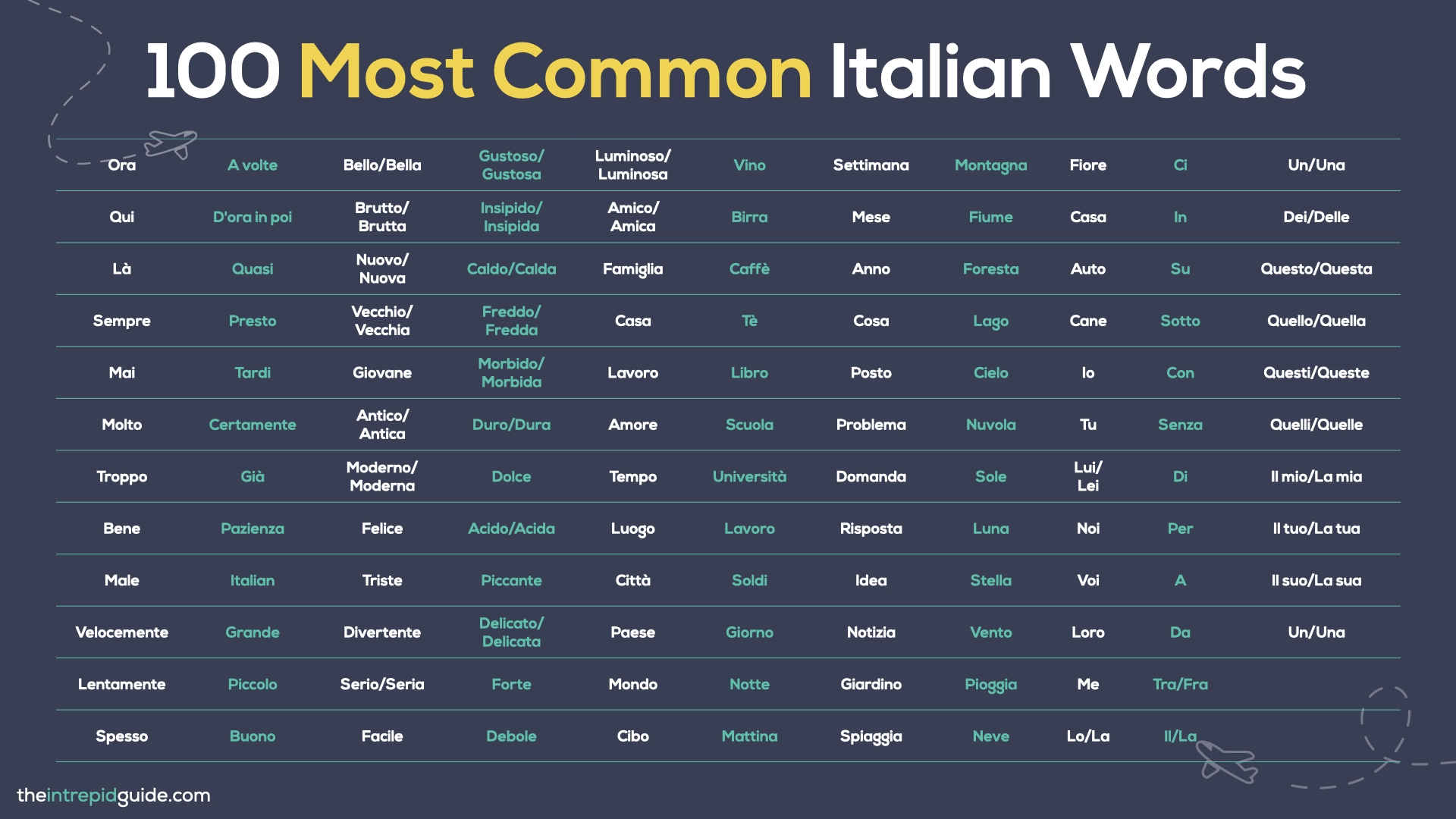
Adverbs add depth to sentences by modifying verbs, adjectives, or other adverbs. They help convey information about time, place, manner, degree, and frequency. Here are 20 frequently used Italian adverbs:
| No. | English | Italian | Pronunciation | Example Sentence (Italian) | English Translation |
|---|---|---|---|---|---|
| 1 | Now | Ora | Oh-rah | Ora è il momento giusto. | Now is the right time. |
| 2 | Here | Qui | Kwee | Vieni qui, per favore. | Come here, please. |
| 3 | There | Là | Lah | Il libro è là. | The book is there. |
| 4 | Always | Sempre | Sehm-pray | Ti amerò sempre. | I will love you always. |
| 5 | Never | Mai | My | Non smetterò mai di provarci. | I will never stop trying. |
| 6 | Very | Molto | Mohl-toh | È molto gentile. | He/She is very kind. |
| 7 | Too much | Troppo | Troh-poh | Ho mangiato troppo. | I ate too much. |
| 8 | Well | Bene | Beh-neh | Parla italiano molto bene. | He/She speaks Italian very well. |
| 9 | Badly | Male | Mah-leh | Mi sento male. | I feel bad. |
| 10 | Quickly | Velocemente | Veh-loh-cheh-men-teh | Corri velocemente! | Run quickly! |
| 11 | Slowly | Lentamente | Lehn-tah-men-teh | Parla lentamente, per favore. | Speak slowly, please. |
| 12 | Often | Spesso | Speh-soh | Vado al cinema spesso. | I often go to the cinema. |
| 13 | Sometimes | A volte | Ah vohl-teh | A volte piove qui. | Sometimes it rains here. |
| 14 | Hereafter | D’ora in poi | Doh-rah een poy | D’ora in poi sarò più attento. | From now on, I will be more careful. |
| 15 | Almost | Quasi | Kwah-zee | Ho quasi finito. | I’m almost done. |
| 16 | Early | Presto | Preh-stoh | Arriva sempre presto. | He/She always arrives early. |
| 17 | Late | Tardi | Tar-dee | È tardi, dobbiamo andare. | It’s late, we need to go. |
| 18 | Certainly | Certamente | Chair-ta-men-teh | Sarò lì, certamente. | I’ll be there, certainly. |
| 19 | Already | Già | Jyah | Ho già mangiato. | I have already eaten. |
| 20 | Patience | Pazienza | Pah-tsyen-tsah | Non importa, pazienza. | Nevermind, patience. |
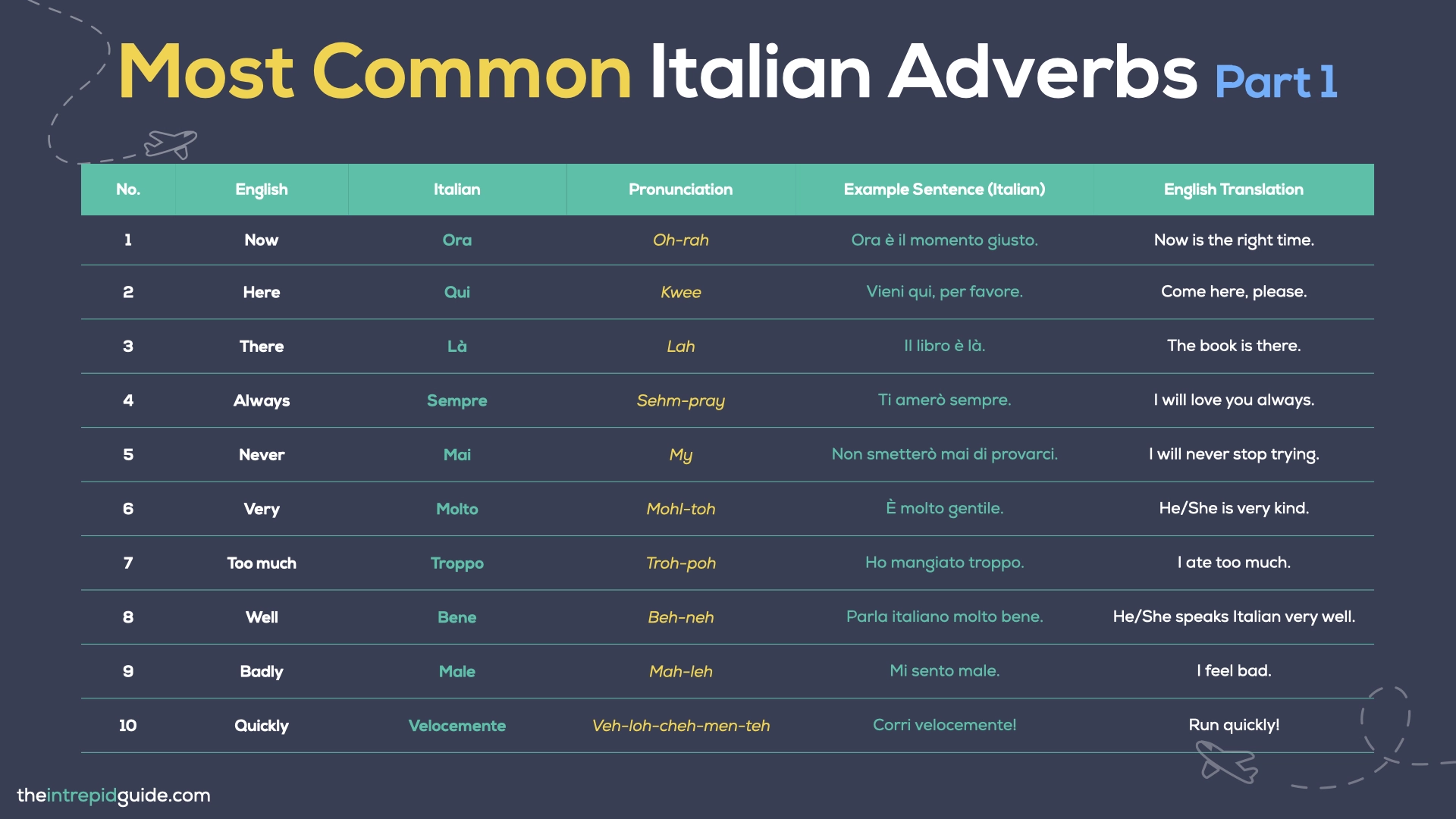
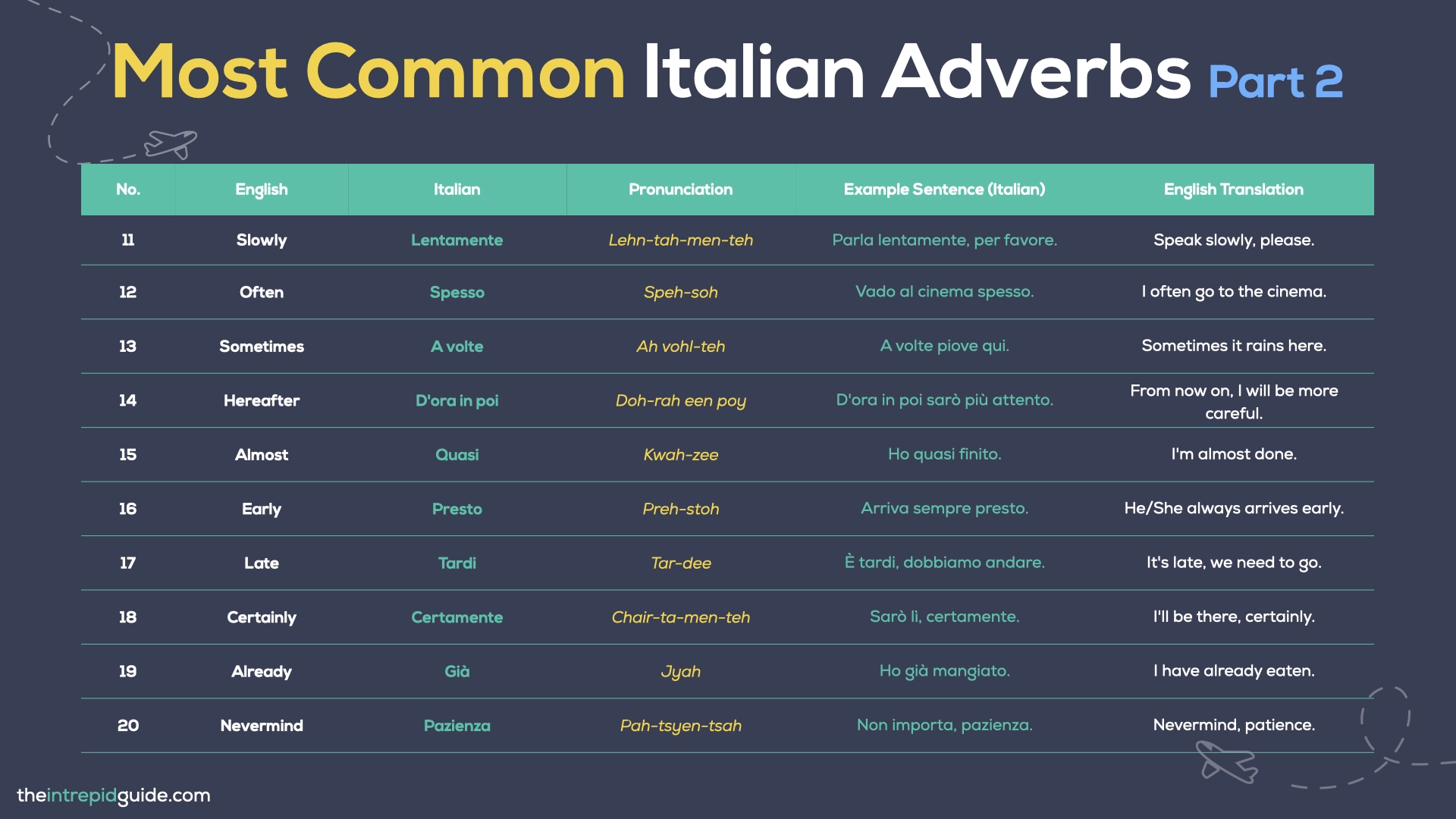
Adjectives bring color and description to nouns. They help convey the characteristics, qualities, or attributes of objects, people, or concepts. Here are 30 frequently used Italian adjectives:
| No. | English | Italian | Pronunciation | Example Sentence (Italian) | English Translation |
|---|---|---|---|---|---|
| 1 | Big | Grande | Grahn-deh | Questo è un grande giorno. | This is a big day. |
| 2 | Small | Piccolo | Pee-koh-loh | Ho un piccolo regalo per te. | I have a small gift for you. |
| 3 | Good | Buono | Bwoh-noh | Questo cibo è buono. | This food is good. |
| 4 | Bad/Naughty | Cattivo | Kaht-tee-voh | Quel bambino è davvero cattivo. | That baby is really naughty. |
| 5 | Beautiful | Bello/Bella | Behl-loh/Behl-lah | Hai una bella casa. | You have a beautiful house. |
| 6 | Ugly | Brutto/Brutta | Broot-toh/Broot-tah | Quel quadro è davvero brutto. | That painting is really ugly. |
| 7 | New | Nuovo/Nuova | Nwoh-voh/Nwoh-vah | Ho comprato un vestito nuovo. | I bought a new dress. |
| 8 | Old | Vecchio/Vecchia | Vehk-kyoh/Vehk-kyah | Questo è un vecchio amico. | This is an old friend. |
| 9 | Young | Giovane | Jovah-neh | È un talento molto giovane. | He/She is a very young talent. |
| 10 | Old-fashioned | Antico/Antica | Ahn-tee-koh/Ahn-tee-kah | Questo è un orologio antico. | This is an old-fashioned watch. |
| 11 | Modern | Moderno/Moderna | Moh-dehr-noh/Moh-dehr-nah | Questo è un edificio moderno. | This is a modern building. |
| 12 | Happy | Felice | Feh-lee-cheh | Sono molto felice di vederti. | I’m very happy to see you. |
| 13 | Sad | Triste | Treest-eh | Questa notizia è davvero triste. | This news is really sad. |
| 14 | Funny | Divertente | Dee-vehr-ten-teh | Quel film è davvero divertente. | That movie is really funny. |
| 15 | Serious | Serio/Seria | Seh-ree-oh/Seh-ree-ah | È un argomento serio. | It’s a serious topic. |
| 16 | Easy | Facile | Fah-chee-leh | Questo compito è molto facile. | This task is very easy. |
| 17 | Difficult | Difficile | Dee-fee-chee-leh | Questo esercizio è difficile. | This exercise is difficult. |
| 18 | Tasty | Gustoso/Gustosa | Goo-stoh-soh/Goo-stoh-sah | Questo piatto è davvero gustoso. | This dish is really tasty. |
| 19 | Bland | Insipido/Insipida | Een-see-pee-doh/Een-see-pee-dah | Questa zuppa è insipida. | This soup is bland. |
| 20 | Hot | Caldo/Calda | Kahl-doh/Kahl-dah | Fa davvero caldo oggi. | It’s really hot today. |
| 21 | Cold | Freddo/Fredda | Frehd-doh/Frehd-dah | Il gelato è buonissimo anche se fa freddo. | The ice cream is delicious even though it’s cold. |
| 22 | Soft | Morbido/Morbida | Mohr-bee-doh/Mohr-bee-dah | Il cuscino è molto morbido. | The pillow is very soft. |
| 23 | Hard | Duro/Dura | Doo-roh/Doo-rah | Questo pane è troppo duro. | This bread is too hard. |
| 24 | Sweet | Dolce | Dohl-cheh | Mi piace il cibo dolce. | I like sweet food. |
| 25 | Sour | Acido/Acida | Ah-chee-doh/Ah-chee-dah | Questa limonata è troppo acida. | This lemonade is too sour. |
| 26 | Spicy | Piccante | Peek-kahn-teh | Questo cibo è davvero piccante. | This food is really spicy. |
| 27 | Mild | Delicato/Delicata | Deh-lee-kah-toh/Deh-lee-kah-tah | Questo vino ha un sapore delicato. | This wine has a mild flavor. |
| 28 | Strong | Forte | For-teh | È una persona molto forte. | He/She is a very strong person. |
| 29 | Weak | Debole | Deh-boh-leh | Mi sento debole oggi. | I feel weak today. |
| 30 | Bright | Luminoso/Luminosa | Loo-mee-noh-soh/Loo-mee-noh-sah | Questa luce è molto luminosa. | This light is very bright. |
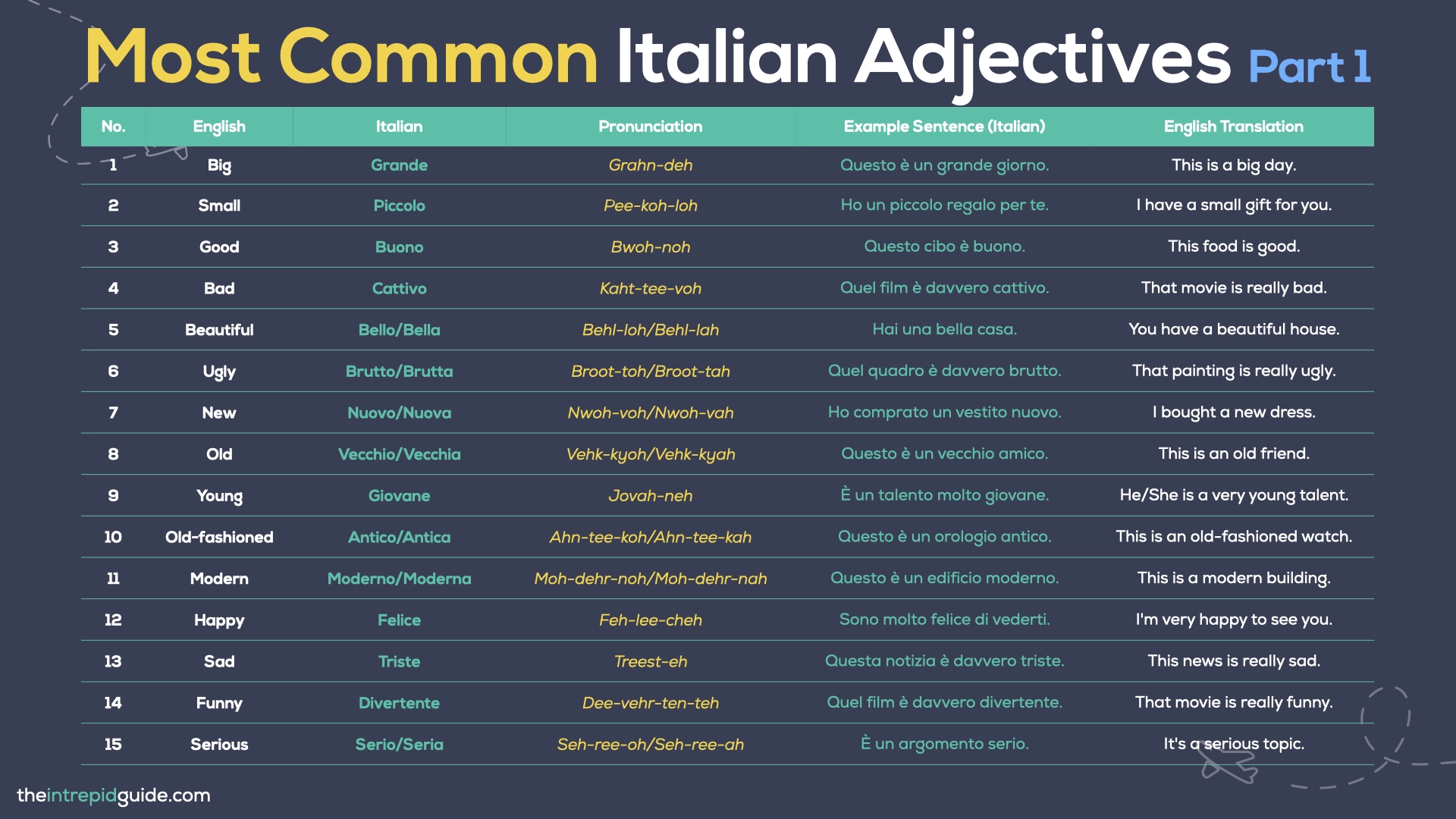
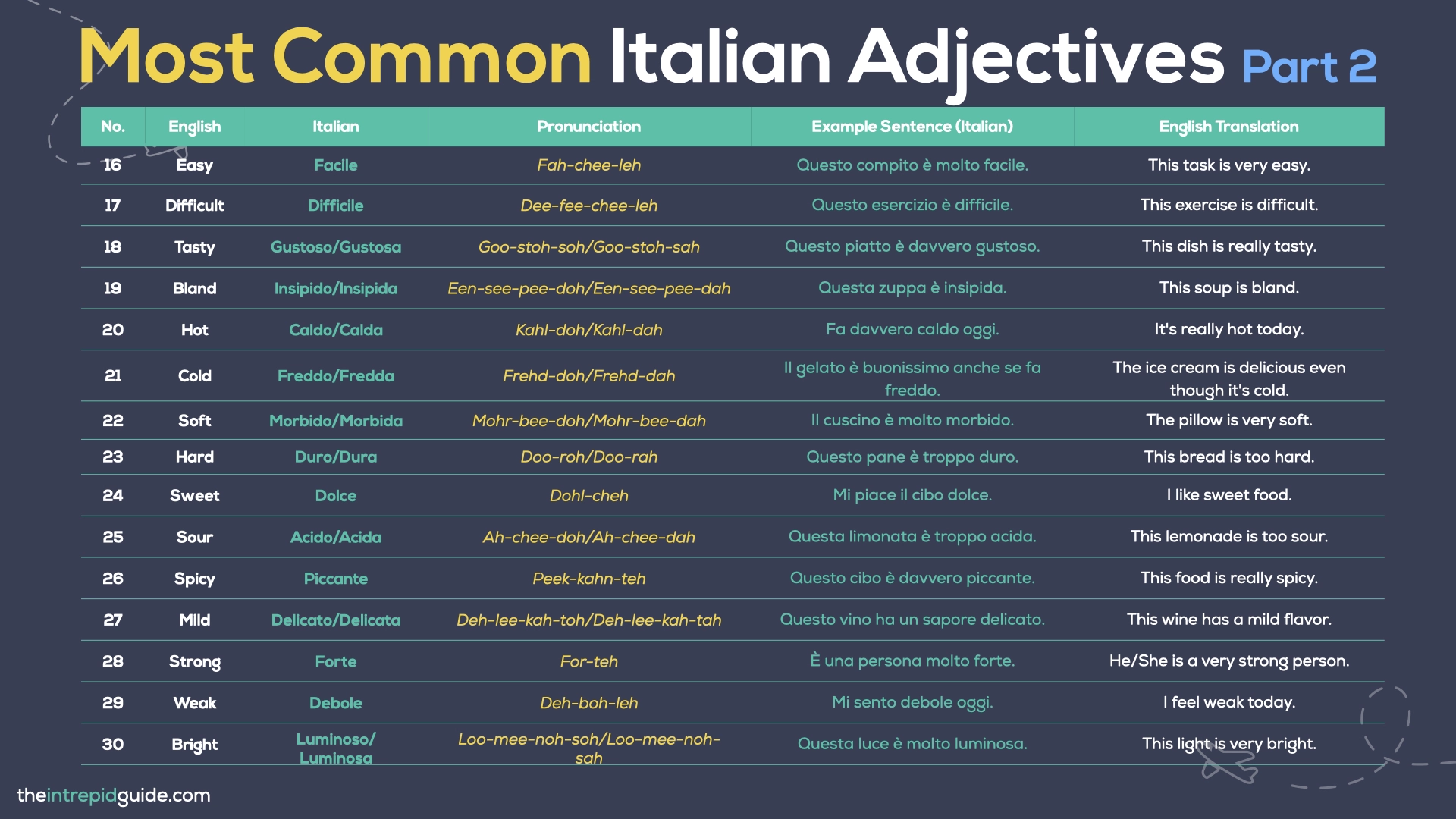
Nouns are the names of people, places, things, and concepts. They are the core components of sentences and provide context to conversations. Here are 50 frequently used Italian nouns:
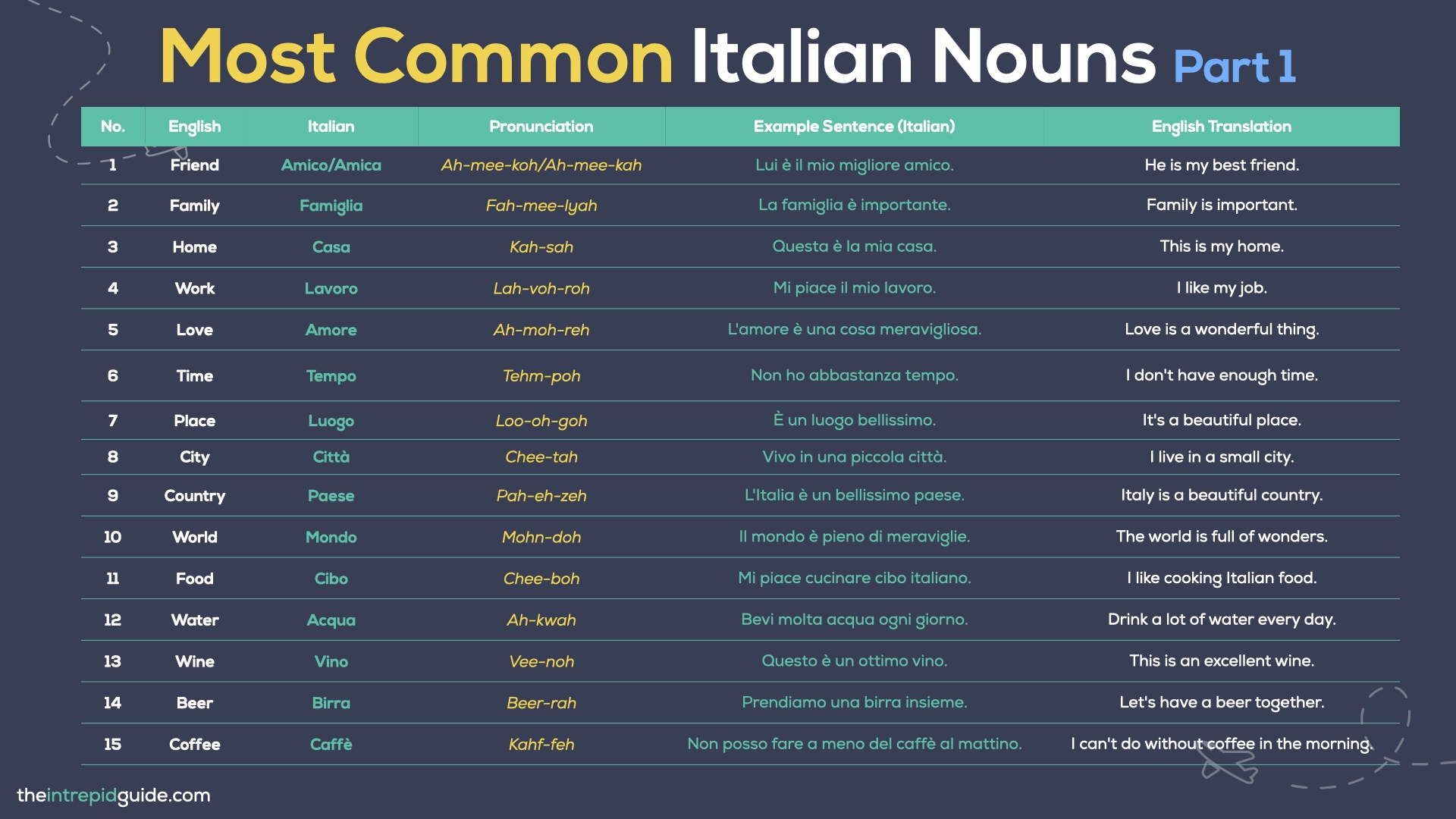
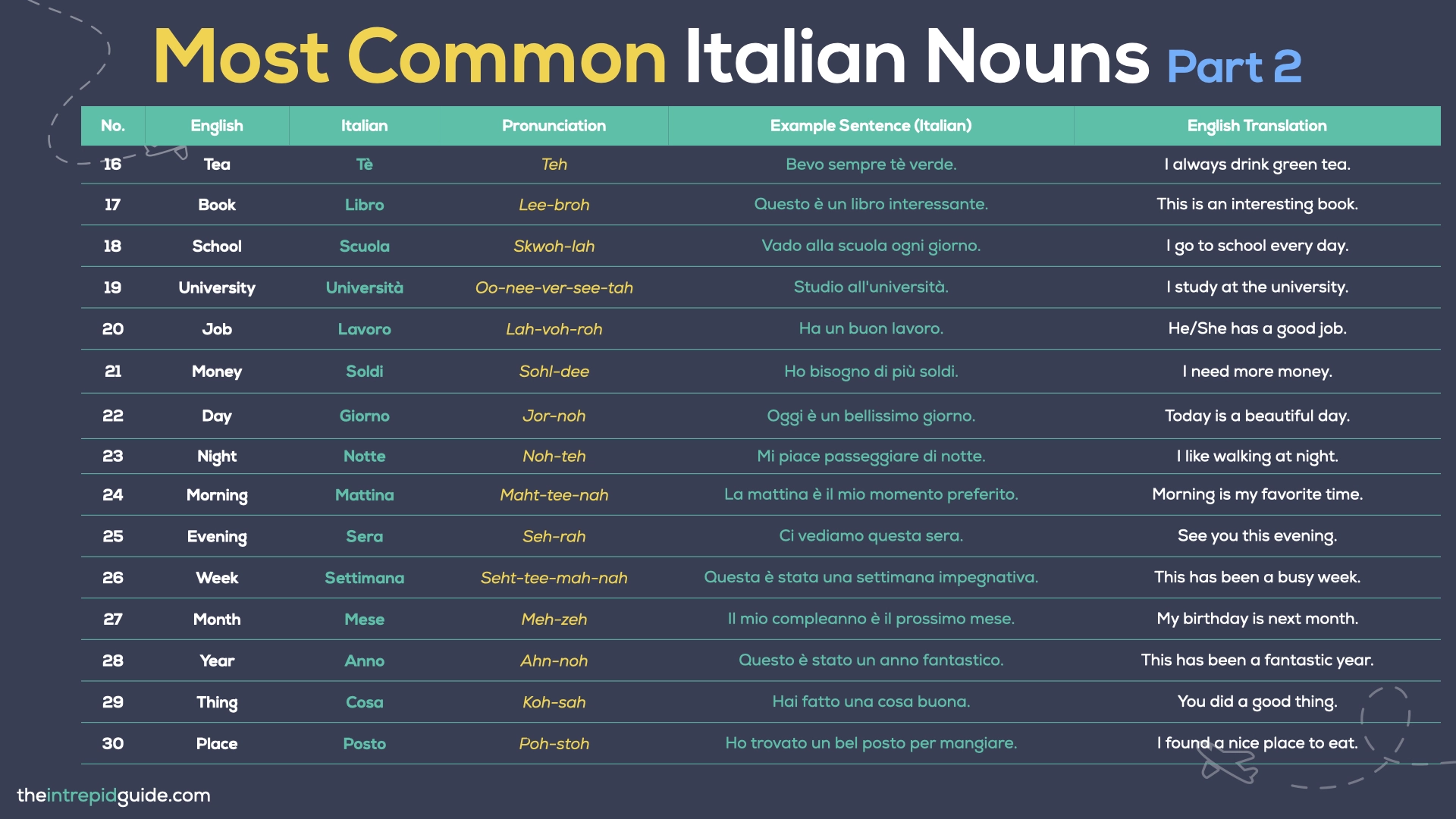
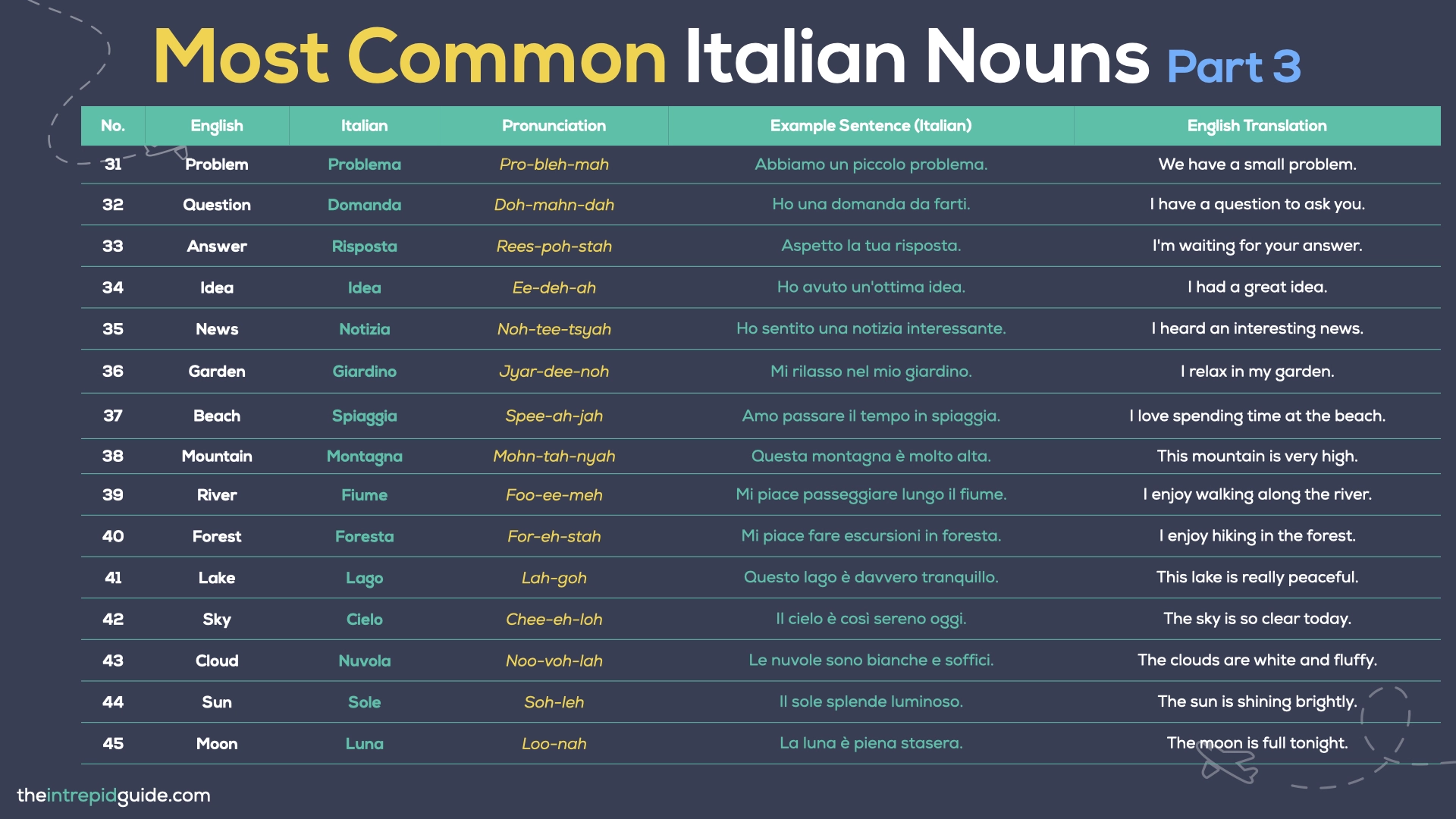
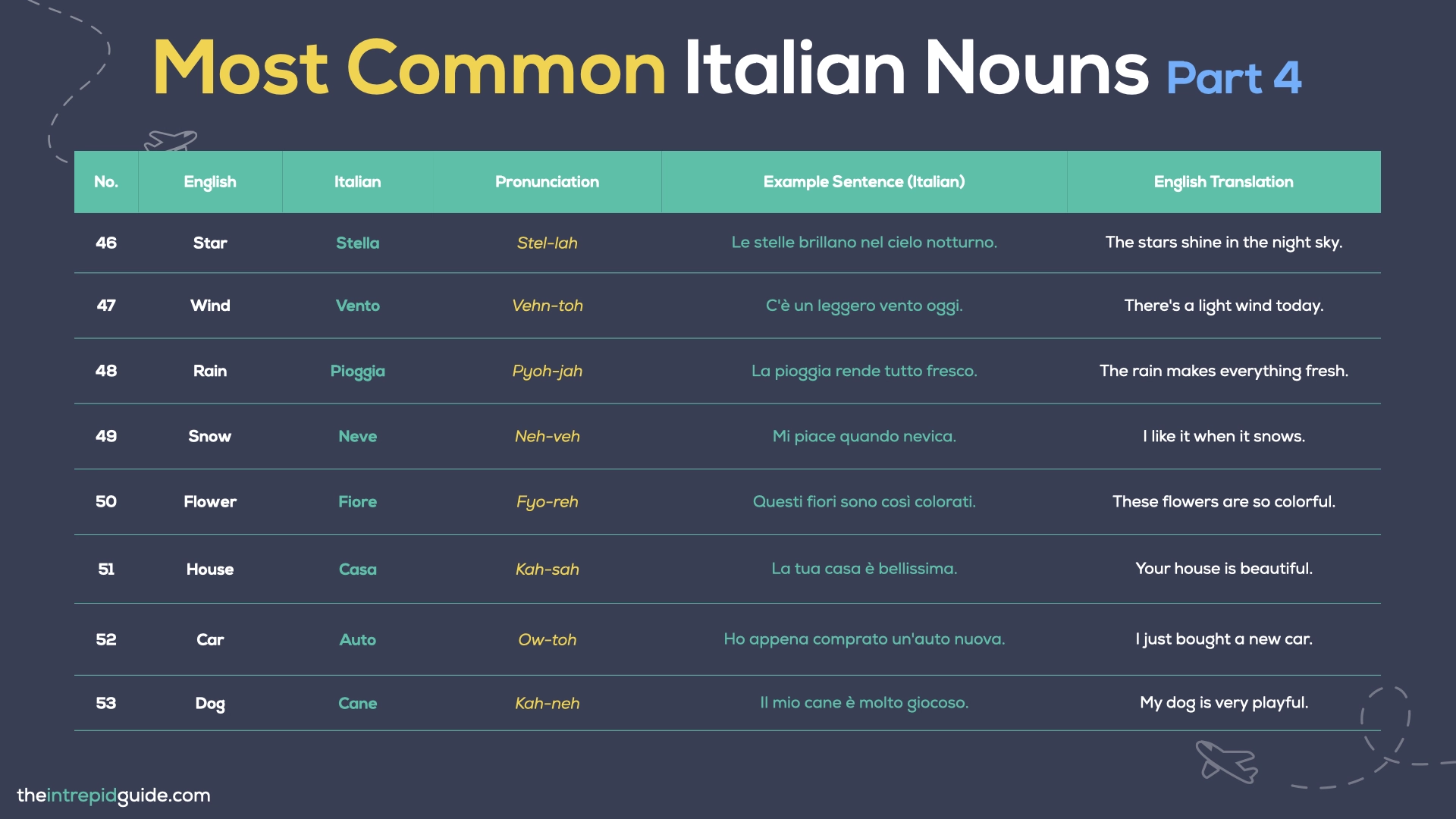
Pronouns substitute nouns, aiding in sentence flow and clarity. They prevent redundancy and facilitate effective communication. Here are 10 frequently used Italian pronouns:
| No. | English | Italian | Pronunciation | Example Sentence (Italian) | English Translation |
|---|---|---|---|---|---|
| 1 | I | Io | Ee-oh | Io amo l’Italia. | I love Italy. |
| 2 | You (singular) | Tu | Too | Tu sei gentile. | You are kind. |
| 3 | He/She | Lui/Lei | Loo-ee/Lay-ee | Lui è simpatico. | He is friendly. |
| 4 | We | Noi | Noy | Noi studiamo italiano. | We study Italian. |
| 5 | You (plural) | Voi | Voy | Voi siete bravi. | You are good. |
| 6 | They | Loro | Lo-roh | Loro sono simpatici. | They are friendly. |
| 7 | Me | Me | Meh | Vieni con me? | Are you coming with me? |
| 8 | Him/Her | Lo/La | Loh/Lah | Lo vedo spesso | I see him often. |
| 9 | Us | Ci | Chee | Ci piace la musica. | We like music. |
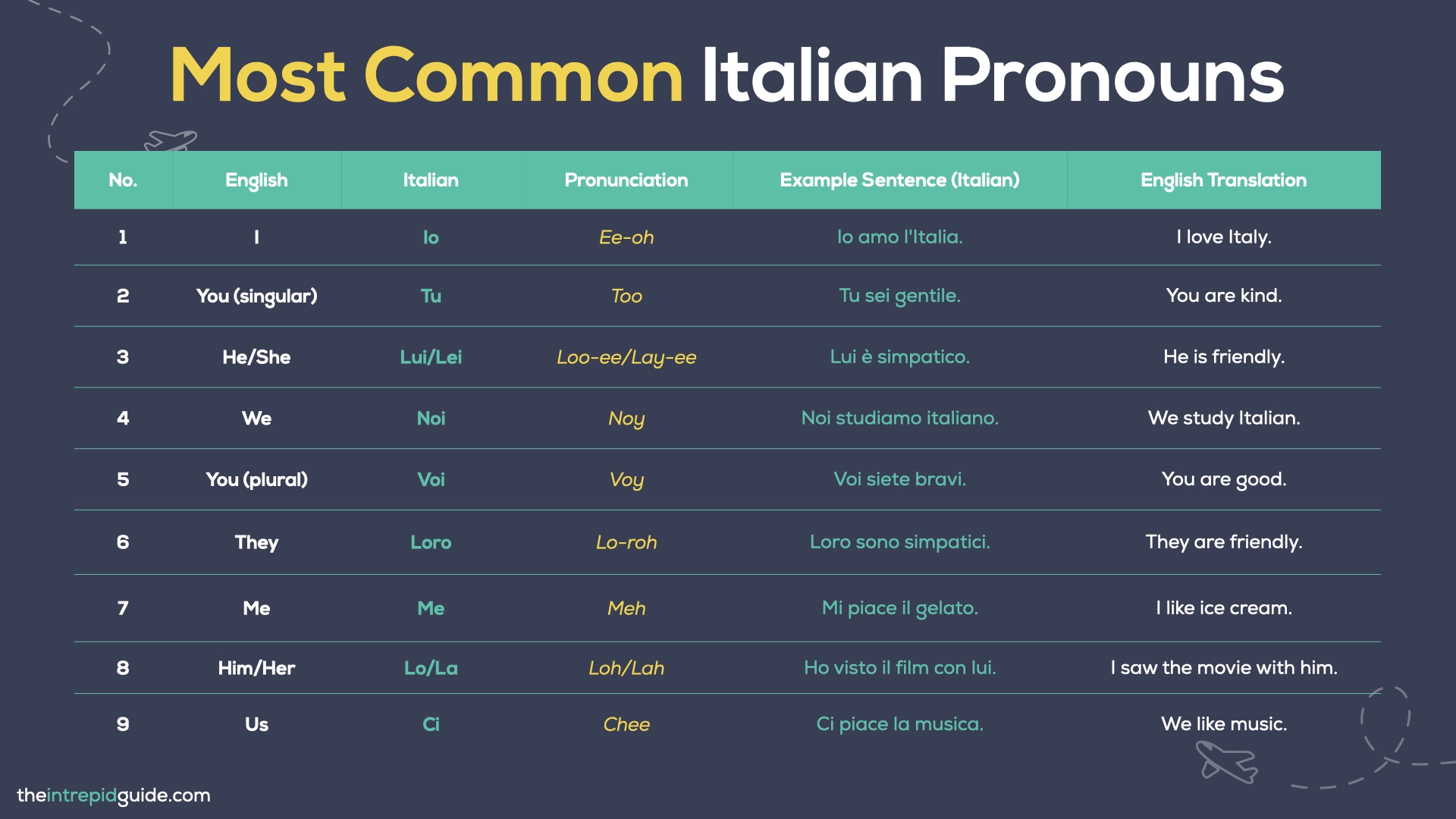
Prepositions establish relationships between words and provide context in sentences. They denote direction, time, location, and more. Below are 10 frequently used Italian prepositions. For more details on how to use them, visit my complete guide to Italian prepositions.
| No. | English | Italian | Pronunciation | Example Sentence (Italian) | English Translation |
|---|---|---|---|---|---|
| 1 | In | In | Een | Vado in Italia. | I’m going to Italy. |
| 2 | On | Su | Soo | Il libro è su tavolo. | The book is on the table. |
| 3 | Under | Sotto | Soht-toh | Il gatto è sotto il tavolo. | The cat is under the table. |
| 4 | With | Con | Cohn | Vado al cinema con te. | I’m going to the movies with you. |
| 5 | Without | Senza | Sehn-tsah | Bevo il caffè senza zucchero. | I drink coffee without sugar. |
| 6 | Of | Di | Dee | Questo è il libro di Maria. | This is Maria’s book. |
| 7 | For | Per | Pair | Ho comprato un regalo per te. | I bought a gift for you. |
| 8 | To | A | Ah | Vado a scuola. | I’m going to school. |
| 9 | From | Da | Dah | Sono da mio nonno. | I’m at my grandfather’s. |
| 10 | Between | Tra/Fra | Trah/Frah | Ci vediamo tra due ore. | See you in two hours. |
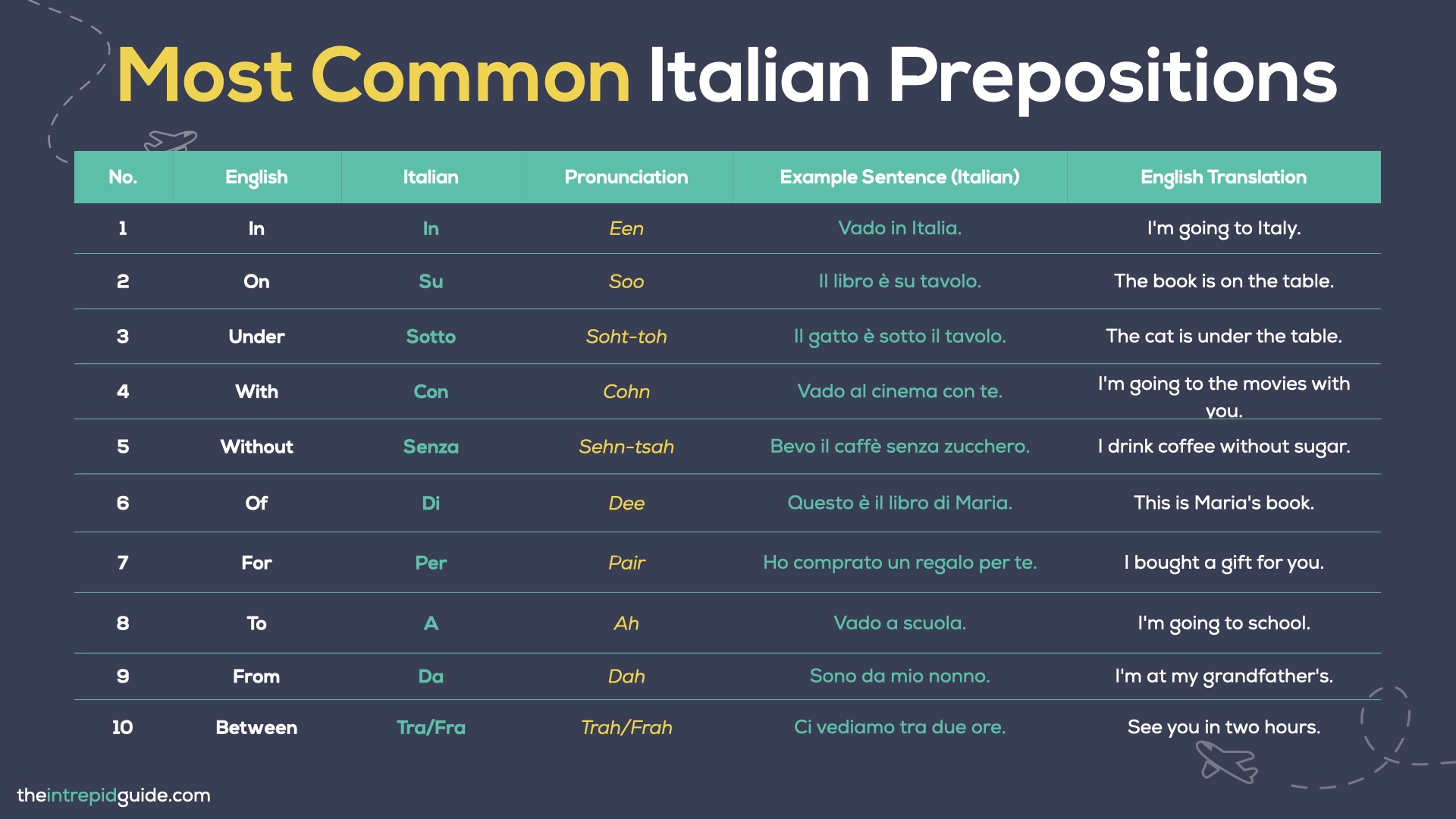
Articles, both definite (the) and indefinite (a, an), accompany Italian nouns and signal specificity. They can be either masculine or feminine. Understanding these articles is vital for accurate communication. Below are 10 frequently used Italian articles. For more details about how and when to use them, visit my complete guide to grammatical gender and Italian articles.
| No. | English | Italian | Pronunciation | Example Sentence (Italian) | English Translation |
|---|---|---|---|---|---|
| 1 | The | Il/La | Eel/Lah | Il libro è sulla tavola. | The book is on the table. |
| 2 | A/An | Un/Una | Oon/Oo-nah | Ho comprato un regalo. | I bought a gift. |
| 3 | Some | Dei/Delle | Day/Del-leh | Ho comprato delle mele. | I bought some apples. |
| 4 | This | Questo/Questa | Kwes-toh/Kwes-tah | Questo è il mio amico. | This is my friend. |
| 5 | That | Quello/Quella | Kwel-lo/Kwel-lah | Quella è una bella macchina. | That is a beautiful car. |
| 6 | These | Questi/Queste | Kwes-tee/Kwes-teh | Questi sono i miei genitori. | These are my parents. |
| 7 | Those | Quelli/Quelle | Kwel-lee/Kwel-leh | Quelle sono le mie scarpe. | Those are my shoes. |
| 8 | My | Il mio/La mia | Eel mee-oh/Lah mee-ah | Questo è il mio cane. | This is my dog. |
| 9 | Your | Il tuo/La tua | Eel too-oh/Lah too-ah | Questa è la tua borsa. | This is your bag. |
| 10 | His/Her | Il suo/La sua | Eel soo-oh/Lah soo-ah | Questo è il suo libro. | This is his/her book. |
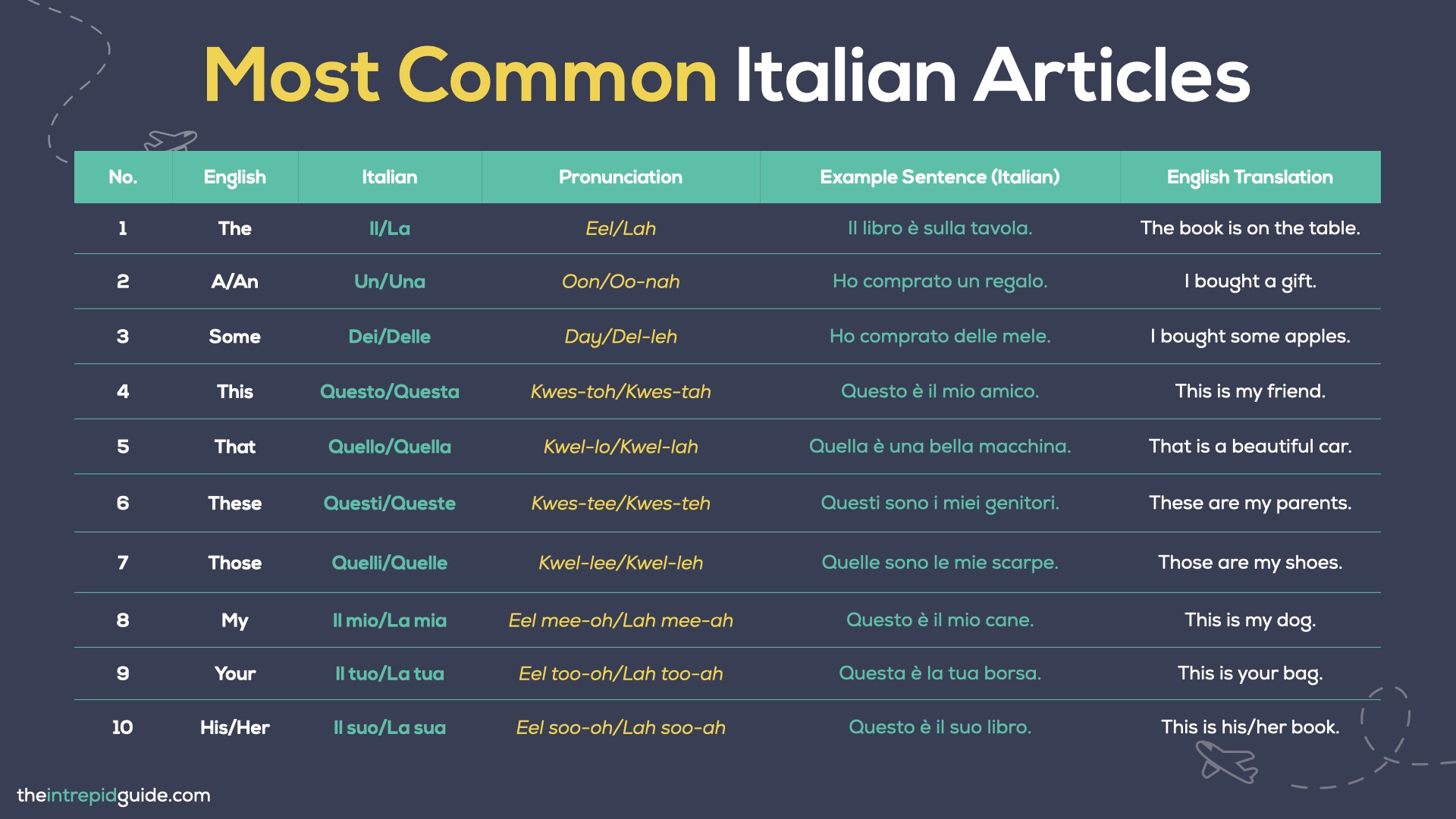
Learning this list of common Italian words and gradually incorporating them into your vocabulary means you’re off to a great start in learning Italian.
Equipped with these 100 most common Italian words, as well as essential Italian prepositions, verb, articles and pronouns, you can begin to confidently engage in conversations with Italian speakers. This is where the fun begins! You’ll be able to express yourself in various contexts thanks to laying a strong foundation to further your language development.
Grazie! Please check your inbox to confirm your email.Before leaving, here’s a quiz for you to actively practice what you’ve learned so far. It might seem tricky at first, but with a proper study method and the right amount of practice, knowing how to master the most common Italian words will be un gioco da ragazzi (a no-brainer)!
What do the following Italian words mean? Choose the correct answer.
 Are you a beginner or an intermediate Italian learner? Got a trip coming up or want to communicate with your Italian partner or relatives in Italian? Learn Italian with my unique 80/20 method
Are you a beginner or an intermediate Italian learner? Got a trip coming up or want to communicate with your Italian partner or relatives in Italian? Learn Italian with my unique 80/20 methodRegistrations are now open to join Intrepid Italian, my new series of online video courses that use my unique 80/20 method. You’ll go from a shy, confused beginner to a proficient and confident intermediate speaker, with me as your trusty guide.
You’ll finally be able to connect with your Italian partner, speak to your relatives and enjoy authentic travel experiences in Italy that you’ve always dreamed of, and so much more.
As a native English speaker who learned Italian as an adult, I know what it’s like to feel hopeless and lack the confidence to speak. I know what it’s like to start from scratch and to even go back to absolute basics and learn what a verb is!
Intrepid Italian was created with YOU in mind. I use my working knowledge of the English language to help you get into the ‘Italian mindset’ so you can avoid the common pitfalls and errors English speakers make – because I made them once too! I break everything down in such a way that it ‘clicks’ and just makes sense.
No matter what your level is, there is an Intrepid Italian course for you, including:
You can join 1, 2, or all 3 courses, it’s entirely up to you. The best part is that you have lifetime access so you learn anytime, anywhere and on any device.
As your guide, I walk you through each lesson, step-by-step, using my unique 80/20 method. My approach is different from traditional methods because I teach you the most important 20% of the language right from the beginning so you can start to speak straight away.
Each course includes video lessons, audio exercises, downloadable worksheets, bonus guides, a private support community, and lifetime access all designed to streamline your learning while having fun.
It even comes with my famous “Celebrate with a Spritz Guarantee”. After 30 days of using Intrepid Italian, if you don’t want to celebrate your new-found Italian skills with an Aperol Spritz, you don’t have to pay a penny! Cheers! 🥂
Join Intrepid Italian here and start learning today!
Ci vediamo lì! (See you there!)

Which of these verbs did you find the most useful? What else would you add? Let me know using the comments section below or join me on social media @intrepidguide or @intrepiditalian to start a conversation.
Thanks for reading and I hope you enjoyed this post.
Like what you see? Subscribe using the form below to have all of my posts delivered directly to your email.
0 comment 0 Facebook Twitter Pinterest Linkedin Tumblr Whatsapp Telegram EmailMichele creates language learning guides and courses for travel. What separates her from other instructors is her ability to explain complex grammar in a no-nonsense, straightforward manner using her unique 80/20 method. Get her free guide 9 reasons you’re not fluent…YET & how to fix it! Planning a trip? Learn the local language with her 80/20 method for less than the cost of eating at a tourist trap restaurant Start learning today!